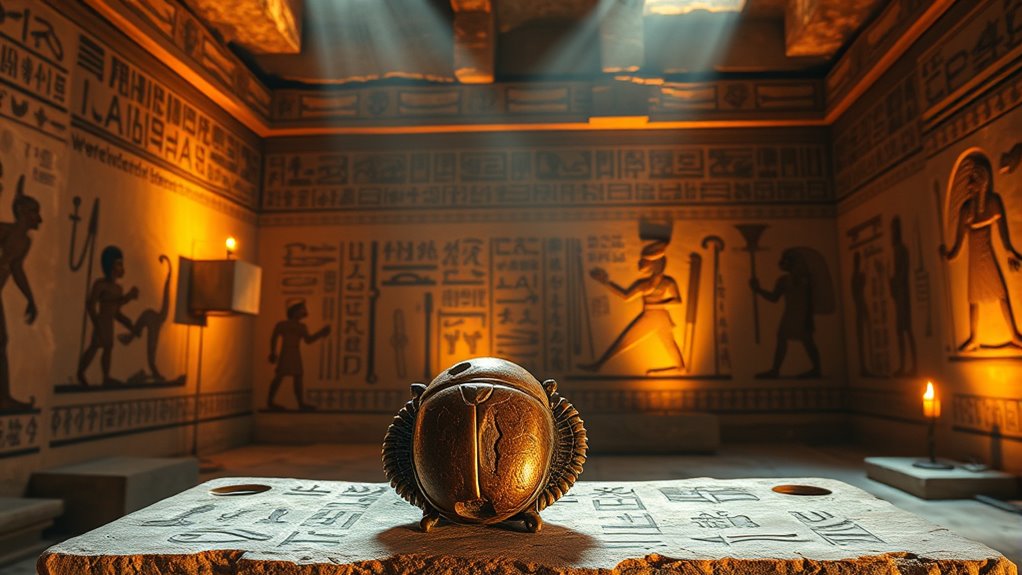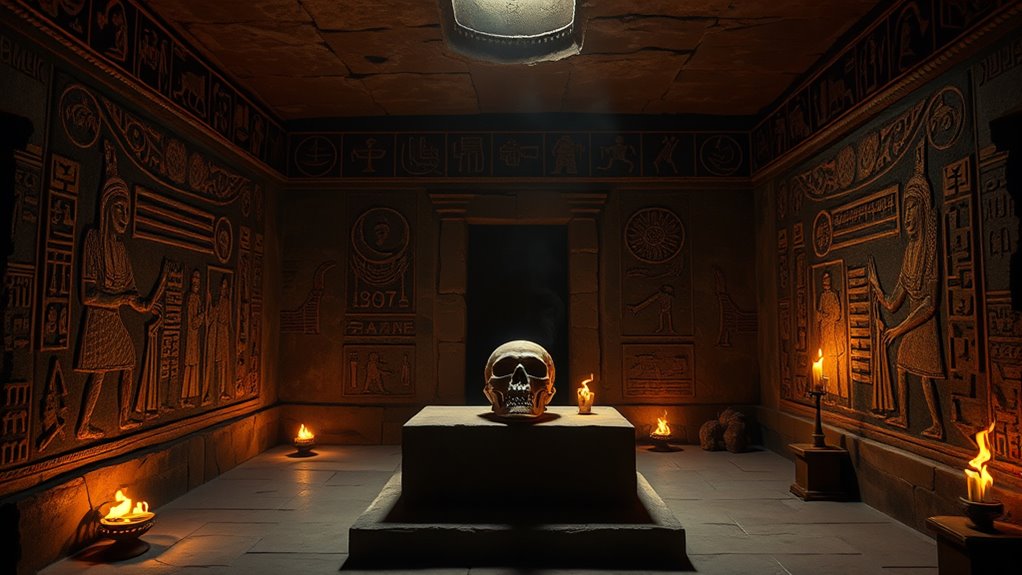In ancient cultures, prophetic dreams were seen as divine messages guiding individuals and societies through symbols and visions. These dreams were often interpreted through sacred rituals performed by priests or shamans, involving offerings, prayers, and symbolic symbols. Communities shared and understood these messages collectively, believing they revealed truths and future events. By understanding these practices, you’ll uncover how dreams shaped decisions and spiritual beliefs across civilizations—continue exploring to uncover even deeper insights.
Key Takeaways
- Prophetic dreams were regarded as divine messages guiding decisions and future events in many ancient civilizations.
- Rituals, offerings, and sacred symbols were integral to interpreting prophetic dreams across cultures.
- Dream interpretation was a communal and sacred practice, often performed by priests or shamans to access divine knowledge.
- Systematic methods, including dream books and symbolic codes, helped decode the messages conveyed through prophetic dreams.
- Insights from prophetic dreams significantly influenced social, political, and spiritual decisions in ancient societies.

Throughout ancient cultures, people believed that dreams could serve as messages from the divine or the supernatural, offering guidance, warnings, and insights about the future. They saw dreams as a direct line to higher powers, capable of revealing truths that weren’t accessible through ordinary waking consciousness. To access these messages, they developed various forms of dream interpretation, which often became central to their spiritual and cultural practices. In many civilizations, interpreting dreams wasn’t left to chance; it was a sacred act, woven into ritual practices designed to discern the divine will. You might find yourself participating in elaborate ceremonies or seeking the help of priests, shamans, or dream interpreters who specialized in decoding the symbols and visions received during sleep.
In ancient Egypt, dream interpretation was a highly organized discipline. Priests kept detailed dream books, and individuals would visit temples seeking guidance on their dreams. These interpretations weren’t arbitrary; they followed specific symbolic codes, with animals, objects, and actions representing particular messages from gods like Osiris or Isis. Ritual practices often involved offerings, prayers, or sacred incantations to facilitate the dream’s divine communication, emphasizing the importance of aligning oneself with spiritual forces to gain clarity. Similarly, in Mesopotamian cultures, dreams were viewed as messages from the gods, and interpreting them became a vital part of decision-making, especially for kings and leaders. Rituals included fasting, prayer, and even sleep divination ceremonies, where dreamers would record their visions and consult with priestly experts to understand their significance.
Across these civilizations, the act of dream interpretation was not merely an individual pursuit but a communal ritual. People believed that by engaging in specific ritual practices, they could open a channel to divine knowledge, ensuring that their dreams conveyed meaningful insights. These practices often involved symbolic rituals, such as bathing in sacred waters, offering sacrifices, or performing specific chants, all aimed at purifying the mind and body to receive divine messages more clearly. The use of sacred symbols in these rituals played a crucial role in strengthening the connection between the dreamer and the divine realm. By participating in these ritual practices, you’d be trusting that your dreams hold the power to influence your fate, offering warnings about future dangers or guidance on important life decisions. This cultural view elevated dreams from fleeting nightly visions to sacred messages, making dream interpretation an essential spiritual act that connected individuals to the divine dimension. Additionally, some cultures believed that dream symbols could be universally understood, allowing people to interpret dreams collectively and share their divine messages more broadly. The interpretation of dreams often involved a shared symbolic language, which helped communities understand and act upon divine insights together. Furthermore, advances in dream interpretation techniques allowed for more systematic understanding of these divine messages, bridging the gap between intuition and structured analysis.
Frequently Asked Questions
How Did Ancient Cultures Interpret the Symbolism in Prophetic Dreams?
You see, ancient cultures interpreted dream symbolism through their unique beliefs and rituals. They believed prophetic dreams held messages from the divine, so they used ritual practices like fasting or dream incubation to enhance clarity. Symbols like animals, numbers, or natural elements were seen as signs or messages, guiding decisions or predicting future events. By understanding these symbols within their cultural context, they sought to uncover divine insights and guidance.
Were Prophetic Dreams Considered Reliable Sources of Divine Guidance?
Dreams were often seen as messages from the gods, but their accuracy wasn’t always trusted. You might think they’re divine guidance, yet cultural skepticism made many question if they were truly reliable. While some believed in their prophetic power, others saw them as mere illusions, like shadows on a wall. So, whether they served as trustworthy sources of divine insight depended heavily on your cultural background and personal beliefs.
How Did the Societal Roles Influence Dream Interpretation Practices?
You see, societal roles greatly influenced dream analysis practices. In hierarchical societies, leaders and priests often received special instructions for interpreting dreams, reinforcing their authority. Common folks had limited access to understanding dreams, which were seen as divine messages for the elite. Your societal hierarchy shaped who could interpret dreams and how, making dream analysis a tool to maintain social order and reinforce power structures across civilizations.
What Differences Exist Between Dreams in Various Ancient Civilizations?
You’ll notice that dreams vary across ancient civilizations through different dream symbolism and cultural variations. For example, Egyptians saw dreams as divine messages, emphasizing symbolism like snakes or pharaohs, while Greeks interpreted dreams through mythological lenses, focusing on gods and heroes. These differences reflect each culture’s beliefs, values, and societal roles, shaping how they understood and valued dreams, ultimately influencing their spiritual and daily lives.
Are There Surviving Records of Specific Prophetic Dreams That Changed History?
You’ll find surviving records of prophetic dreams that changed history through detailed Dream symbolism and Historical case studies. For example, King Nebuchadnezzar’s dreams predicted future events, and the Oracle of Delphi’s visions influenced Greece’s decisions. These stories reveal how dreams served as divine messages, shaping civilizations. By analyzing these records, you gain insight into how prophetic dreams impacted political, social, and cultural developments across different eras.
Conclusion
You now see how prophetic dreams once spanned civilizations like a mighty river, guiding kings and shaping destinies. These visions, woven into the very fabric of ancient life, reveal a profound connection between the subconscious and divine foresight. Remember, uncovering these dreams is like opening a treasure chest overflowing with divine secrets—an insight so powerful, it’s as if the universe itself whispered its deepest truths just for you.









